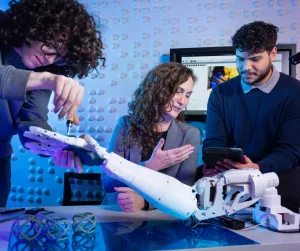 Jaime Banks, an Associate Professor and PhD Director at the School of Information Studies, has secured $600,000 in grant funding for an innovative research project focused on human interaction with AI.
Jaime Banks, an Associate Professor and PhD Director at the School of Information Studies, has secured $600,000 in grant funding for an innovative research project focused on human interaction with AI.
The grant, funded by the National Science Foundation (NSF) through its Computer and Information Science and Engineering (CISE) directorate, and more specifically, the Human-Centered Computing (HCC) funding arm, is for research into “Mind Perception in AI Companionship: Testing the Assumptions of Social Theories.”
As Principal Investigator (PI), Banks will lead an investigation into how language and social cognition shape our understanding of artificial intelligence along with co-PI, Caleb Carr, a professor of communications from Illinois State. iSchool PhD student Zhixin Li will be supporting that work.
This funding marks a significant milestone after two years of dedicated work in securing this grant, paving the way for a deep dive into social AI’s role in human lives. Over the next four years, Banks and her interdisciplinary team will explore the psychological and social dimensions of AI, addressing pressing questions about how we humanize and relate to these technologies.
Companies like Replika and Gatebox, are relatively new technologies, designed to stave off loneliness in real people through the development of AI companions. Recent news regarding AI has been about internet tools which students and workers can use to help lighten their workloads or how they optimize algorithms to capture our attention in all kinds of insidious ways. Less attention is given to social AI–machines designed to quench humans’ inherent need to connect with others. This is a critical gap in scientific knowledge and technology literacy because social AI are increasingly integrated into everyday social media use and (thought to have been driven by the COVID-19 pandemic) adopted as standalone technologies to help with loneliness.
This is a study into the social-cognitive processes involved in these companion machines. From the way we even refer to them as “companions” and the way they are designed to interact with users, to how they make users feel, Banks says, “We want to understand the subjective experience of seeing an AI companion as someone, and how that experience links to the positive or negative effects.”
As Banks embarks on this research project, her work promises to contribute insights into the evolving relationship between humans and AI. By investigating the psychological and social factors that influence our interactions with these technologies, Banks and her team aim to conduct rigorous scientific work–the insights from which may inform future developments in AI design as well as policy, practice, and ethics.
